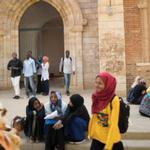War in Sudan 15 April 2023: Background, Analysis and Scenarios
The war of 15 April 2023 is a pedigree of the long-protracted
conflict in Sudan. An end to it should be sought through addressing
the causes of protracted conflicts and durable disorders which
characterize the history of post-independence Sudan. The military
has been central in the political life of the country throughout.
The December 2018 revolution ousted the kleptocratic regime of
President al-Bashir and offered an opportunity for transition to
democracy in Sudan. A civilian–military coalition government was
formed to steer the country through the transition. This arrangement
failed due to wrangling among the transition partners, with failures
in the making since 2019. Efforts to rescue the transition failed and
a coup in 2021 shattered the dreams of a democratic settlement,
especially for young Sudanese men and women. Efforts to build a
broad-based coalition to confront the military and advance transition
to democracy have been thwarted by societal cleavages.
The war has inflicted egregious human suffering and has involved
destruction of infrastructure, looting, pillaging, and ransacking of
homes and private enterprises. Millions of Sudanese have been
displaced within the country and hundreds of thousands have sought
refuge in neighbouring countries, fleeing under difficult conditions.
Those trying to cross to Chad from Western Darfur were attacked
and those on their way to Egypt got stranded at the border. Social
polarization threatens to break the fabric of society, especially in
areas like Darfur that are yet to recover from 20 years of devastating
wars. Continuation of the war will further divide communities and this
will make getting back to normalcy extremely challenging when the
war is over.
The warring parties seem determined to continue fighting, each
hoping to defeat the other. But there are no signs of significant
advances by either side. The hardline position of the SAF (Sudanese
Armed Forces) may be explained by the backing it receives from the
Islamists who are accused of amplifying the differences between
the SAF and the RSF (Rapid Support Forces). The RSF also adopts
a hardline position by demanding the removal of SAF leadership.
This illustrates how far the country currently is from security sector
reform, whose aim is to have a unified, professional Sudanese army
into which the RSF is integrated. This latter was one of the key
provisions of the Political Framework Agreement signed in December
2022. Without a unified army, there can be no hope for a united
Sudan.
The US–Saudi initiative is so far the only diplomatic effort to have
succeeded in bringing the warring parties to the negotiating table,
if only indirectly. The talks hitherto focused on short-term ceasefire
and excluded civilians; mediators suspended the talks due to lack
of progress. It is not known when the talks will resume or what
the issues to be negotiated will be. Other initiatives include that
of the IGAD (Intergovernmental Authority on Development), which
is backed by the African Union. The key objective is to bring the
two Generals into face-to-face negotiations, which may be unlikely
prior to achieving a long-term ceasefire. The most recent initiative
was mounted by the Egyptian President and addressed Sudan’s
neighbours. One factor that has contributed to the lethargy of the
different initiatives is that there is lack of harmony among them and
the actors behind them are not all on the same page. If stopping the
war and resuming a democratic transition is the goal of mediators,
then a more coherent approach is needed.
It is recommended that pressure be put on the SAF and the RSF
to secure a long-term, credible and verifiable ceasefire agreement.
The warring parties should be made to realize that their legitimacy
is on the line and that humanitarian access must be granted. One
important recommendation relates to the necessity (and inevitability)
of unifying mediation platforms. The Jeddah, IGAD and President
al-Sisi initiatives should be merged and speak with one voice.
Additionally, countries like Egypt and the United Arab Emirates
(UAE) must be party to any credible initiative capable of delivering
positive, tangible results. Civilians’ involvement in the negotiations
is a necessary condition for civilian control of the transition and
so should be supported rather than subjected to the whims of the
SAF and the RSF. Importantly, civilians’ ability to devise credible and
effective proposals within an inclusive political process stands in
need of support from external partners





